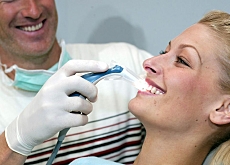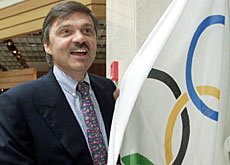Dentists open wide to the future

Going to the dentist in Switzerland can cost you more than a tooth - it can cost you an arm and a leg.
The double shock of a drilling session followed by a hefty invoice is one reason why some patients avoid the dreaded chair, or seek cheaper treatment abroad.
However, a visit to this year’s DENTAL 2005 exhibition in Basel offers even confirmed “dentaphobes” a glimpse of a world where those annual visits are no longer a painful – or exorbitantly expensive – experience.
That, at least, is the hope of Ulrich Rohrbach, president of the Swiss Dentists’ Association (SSO).
“I am glad that I’m a dentist today and not 40 years ago,” Rohrbach, who runs his own practice near Bern, told swissinfo.
“We have made impressive improvements in areas including technology and materials, and continuing advances mean that going to the dentist in future will be even less painful or fearful an experience than it is today.”
One of the most promising areas for future dental treatment is laser surgery technology – although still at the research stage, Rohrbach is confident that it could be coming soon to a surgery near you.
He says standardisation of such techniques could eliminate to a large extent the “mechanical aspects” of dentistry, in particular the universally detested drill.
Swiss connection
And he stresses the extent to which such procedures have already changed – many operations that would once have taken an hour or more are now completed within minutes.
Another area where huge progress has been – and is being – made is applied materials science.
Anyone who doubts that needs only compare the metal-based fillings of a few decades ago with their modern counterparts, which are not only more comfortable, but last far longer and look considerably better.
The two global market leaders in the field of dental implants both have strong Swiss connections – Sweden’s Nobel Biocare has its main listing on the Swiss stock exchange, while main rival Straumann is based in Basel.
“[The Swiss connection] is probably not just coincidence,” says Rohrbach. “Switzerland, with its high standard of living, is a good market for many products in the sophisticated part of dentistry – particularly more expensive treatments.
“This is a rapidly-growing market, not just in Switzerland, but particularly here. In addition to [an ageing population], the quality required of dentists here is probably on a higher level than in most other countries.”
More responsibility
Regarding the temptation to seek cheaper treatment abroad, Rohrbach says many patients risk making false savings – particularly if fillings or implants have to be replaced after just a few years.
He concedes that the Swiss spend more per capita on their teeth than virtually any other nation, but argues that this reflects the overall cost of living in Switzerland and the superior quality of Swiss dentistry.
And he points out that, while the total figures may appear astronomical – SFr3 billion per year to keep Swiss teeth in shape – that translates into an average of just SFr35 per person per month.
“That is far below the amount spent on tobacco or alcohol. Another aspect is that under our system the patient has much more responsibility, as most dental work must be paid for directly.
“Patients therefore have a direct interest in optimising both price and quality, and dentists here have [in that sense] to operate in a real market.”
Teething problems
However, Rohrbach identifies two problems that will need to be addressed in years to come.
First, the Swiss system of excluding most basic dental care from (compulsory) health insurance cover is based on the traditional premise that dental damage can generally be avoided by regular oral-hygiene measures.
However, research in microbiology and other disciplines increasingly suggests that some patients are simply more vulnerable than others even to simple caries (decay).
Second, there is what Rohrbach calls “Swiss perfectionism”.
“This is a problem across the whole field of healthcare. The possibilities offered by modern research and industry are more and more perfect – but they come with an ever-higher price.
“For many problems in dentistry, what we still need are simple solutions at lower prices. That need not lead to a contradiction in quality terms, as not even a poor patient need tolerate poor work, but the menu of options does have to be very wide.”
swissinfo, Chris Lewis in Basel
The DENTAL 2005 international dental technology exhibition is being held in Basel from June 1 to 3.
The SSO is also organising an international further education and training congress for dental professionals to coincide with the exhibition.
The congress brings together some 1,200 dentists and more than 1000 dental assistants.
Switzerland is renowned for the high quality – and prices – of its dental practitioners.
It also boasts the two market leaders in the field of dental implants: Swedish-Swiss Nobel Biocare and Basel’s very own Straumann
Rohrbach says their presence here reflects the “sophisticated” nature of the Swiss market for dental services and products.

In compliance with the JTI standards
More: SWI swissinfo.ch certified by the Journalism Trust Initiative










You can find an overview of ongoing debates with our journalists here . Please join us!
If you want to start a conversation about a topic raised in this article or want to report factual errors, email us at english@swissinfo.ch.